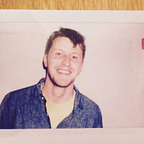Three lessons: my first year at IF
Wow, that was fast - it’s been a year since I joined IF.
IF has grown a lot this last year. I have too — learning from a great group of workmates and the work itself.
This is a good moment to pause and consider what the big lessons for me have been in these twelve months. As I find thinking aloud makes my thoughts clearer, here they are:
1. Rushing wastes time
Rushing work ends in two ways:
- Disappointing work, that’s too late to change
- Doing the work again
It’s taken me over 10 years to learn this. And only this last year has it truly sunk in. Rushing doesn’t save you time, it just wastes it later on.
I’m naturally impatient. While this is good for getting stuff done, it has also meant I give in to the temptation to rush work. Rushing the ‘small things’. Not proofreading emails. Not practising presentations. Not preparing for important meetings. Not making typography consistent. Not seeing how a website works on different devices. Not testing colour contrasts. Not double checking measurements before work goes to print.
This isn’t laziness, it’s rushing. Fooling myself that there isn’t time to do these ‘small things’. Yet the truth is these are not ‘small things’, they are details. Details really matter, because when lots details are rushed, the overall quality of the work suffers. A lot.
Great products aren’t just great ideas. They’re hundreds of small decisions and details (elegantly) brought together. Rushing fundamentally gets in the way of making great products.
I owe it to the people and culture at IF me finally learning rushing wastes time. Helping me slow down and consider the details of everything we do — writing, graphics, code, research, talks, meetings, workshops, products. To look at these properly and give them the time they need.
Since, I’ve not said to myself “oh, I wish I rushed that.” Funny That.
2. Enjoy having ideas
Digital rights. Data ethics. Building services people can trust and rely on. I’m lucky enough to do really hard and important work. I take what I do seriously. But for a while I tricked myself in thinking that working on serious stuff meant you don’t experiment or play with different ideas. In fact I’m learning the opposite is true.
They need more ideas and experimentation, precisely because these areas I mentioned are hard and important. Helping invent a positive new future, means showing what’s possible — and a big part of that is giving yourself and others permission to have lots of ideas and test them. That’s a big lesson for me.
This also means forcing myself to have ideas within real constraints like what’s technologically possible in the next two years. Otherwise your ideas will remain just that, ideas. As is being disciplined with myself, knowing when the time for new ideas is over, picking one, developing it and delivering.
Looking back over the last year, the work of which I am proudest is when others and I played with ideas at the beginning. Not only because playing is fun, but because it directly made the work better, more considered and thoughtful.
3. Let others speak
I interrupt people. I don’t think this comes from a bad place like not wanting to hear other people out — I try hard to listen, but I often get over excited and talk over someone or cannot hold my thoughts in my head and just start talking. My concentration span is poor. Whatever the reason it’s rude and I feel shame every time I forget myself and do this to people.
Over the last year I’ve become more aware of this bad habit of mine. I’m trying to improve and to become more self aware. One strategy is to write my thoughts down and let others finish. I don’t always succeed and there is a long way to go. I’m still on a journey.
Feedback culture
What has made a big difference is colleagues, past and present, who have been honest with me and said I speak over them and others. It’s both hard and humbling to hear this sort of feedback. I bet it’s not easy to give it either, which makes me especially grateful for it. Credit must go to Sarah — who has consciously made a environment that is open, where people feel safe to give and hear feedback.
Truthful feedback is essential to improving your work, habits and ultimately yourself. Another big lesson.
